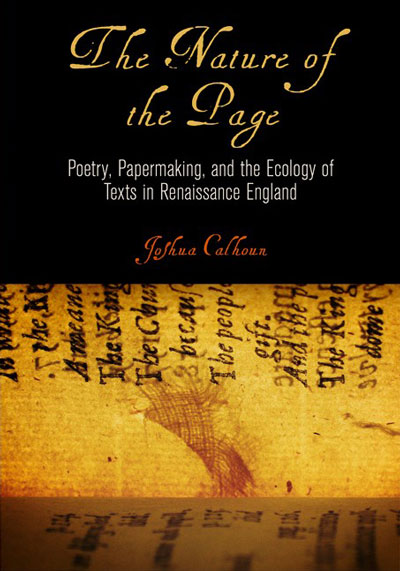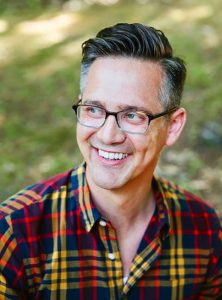

- This event has passed.
Hydrophilic Archives: Early Handmade Paper in Unstable Environments

Richard & Mary Rouse Annual History of the Book Lecture
Joshua Calhoun (Associate Professor of English, University of Wisconsin, Madison)
Paper loves water, but the hydrophilic property of paper is both a feature and a bug: it cannot be created without water, and it can be easily destroyed by water. This talk explores the revolutionary, vulnerable qualities of early handmade paper and considers the ecological resources we use to preserve the documentary evidence we have received from the past on thin pliable, handcrafted leaves of organic matter.
“Hydrophilic Archives” takes up an inconvenient truth: there is an inverse correlation between book preservation strategies and environmental stewardship. The preservation of records has a significant environmental cost, and that cost is expected to rise precipitously as resources become scarcer. What, then, is the future of archival libraries in a changing climate, and how do we responsibly and sustainably support the preservation of cultural heritages?
 Professor Calhoun focuses on the history of handmade paper, in his forthcoming book, The Nature of the Page, which explores the ecopoetic interplay between literary ideas and the physical forms they are made to take as sixteenth- and seventeenth-century texts. Made from recycled clothes, slaughtered animals, and felled trees, poetic texts in Renaissance England were filled with visible traces of ecological matter. Calhoun argues that the flora, fauna, and mineralia from which a Renaissance text—or a clay tablet, or a birch bark map, or an iPhone—is made are legible, significant elements of its poetic form.
Professor Calhoun focuses on the history of handmade paper, in his forthcoming book, The Nature of the Page, which explores the ecopoetic interplay between literary ideas and the physical forms they are made to take as sixteenth- and seventeenth-century texts. Made from recycled clothes, slaughtered animals, and felled trees, poetic texts in Renaissance England were filled with visible traces of ecological matter. Calhoun argues that the flora, fauna, and mineralia from which a Renaissance text—or a clay tablet, or a birch bark map, or an iPhone—is made are legible, significant elements of its poetic form.
Scholarship on the history of media has tended to imagine humans as the points of textual origination, as if the materials used to make paper, to make ink, to make printing type, and so on, simply existed in abundance, waiting to be harvested. In reality, ecological availability and scarcity make certain kinds of human records possible; at the moment those possibilities are realized and integrated into textual forms, textual corruption and disintegration begins. Texts, in other words, are and arise from within unique ecosystems. The Nature of the Page reveals a more ecologically deterministic, but also a more poetic past and future for those endlessly intriguing sites of humanistic and environmental negotiation we call “texts.”
The Deaths of Books: Facing the Mortality of Texts is the tentative title for the book he is currently researching. In this work, he puts the materiality of texts into conversation with the mortality of texts by thinking about how books die. The work extends the “ecology of texts” approach he advocates in The Nature of the Page, but pushes his new research into deeper conversations with environmental science and conservation practices by asking questions such as: What is the environmental cost of historical preservation? How much preservation is enough? Is digitization really more environmentally friendly than stabilizing aged texts in climate controlled vaults? Why is it common to allow destructive analysis on samples from historical buildings and historical bones, but not from historical books?
